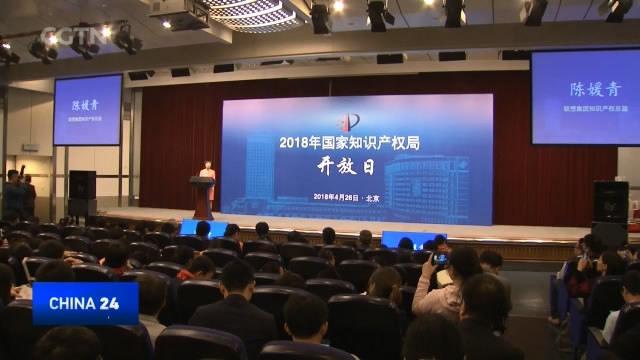
21:00, 26-Apr-2018
World Intellectual Property Day: China will push to further improve quality of patents
02:56

Today marks World Intellectual Property Day, a time to raise awareness on the role that patents, trademarks and copyrights play in encouraging innovation. How did China fare in 2017 when it comes to intellectual property rights? CGTN's Wei Lynn Tang reports.
"Stronger intellectual property rights protection is a requirement of foreign enterprises, and even more so of Chinese enterprises." Chinese President Xi Jinping reiterated this at the Boao Forum for Asia 2018.
According to the 2017 State Intellectual Property Office's satisfaction report, China has seen an improvement in all its scores for first-level indicators. These include: legal policy and protection, law enforcement, management and service, as well as publicity and education.
However, its director general says China still lags that of developed countries.
ZHANG ZHICHENG, DIRECTOR GENERAL PROTECTION & COORDINATION DEPT., CHINA'S STATE INTELLECTUAL PROPERTY OFFICE "We have a large gap in the number of patents we own, as well as effective patent volume per capita, compared with that of the US. Secondly, in terms of the distribution of patents, we only have tens of thousands compared to the US's more than 200-thousand every year. Going forward, we should increase efforts in improving the independent ability to innovate among Chinese companies, while continuing to cooperate with other nations in protecting IP rights."
According to Zhang, foreign joint ventures now have stronger means to protect themselves, in line with the Chinese government's adherence to equal protection. He adds, while the likes of Huawei already have a large number of patents, some of the country's small and medium-sized enterprises are still weak in securing protections for their inventions.
In 2017, patent applications in China rose 14 percent year-on-year to almost 1.4 million, with patent authorization rising nearly 4 percent to 420-thousand.
Corporations commend China's development in IP rights since the effort was outlined in the country's 12th 5-year plan.
SHIRLEY CHEN, IP DIRECTOR AND COUNSEL LENOVO GROUP "For example in AI, big data and the energy use, these have brought about new insights in intellectual property. One area where we can look to improve is: How do we balance protection between an innovation source and code?"
China's recent reorganization of its State Intelletual Property Office will quicken China's environment for IPR protection. Its scope of duties will expand to also include administering trademarks and geographic indicators, beyond just its patent responsibilities.
WEI LYNN TANG BEIJING China's continued focus on strengthening its IP rights landscape is indeed timely, as it seeks to open up more to foreign businesses and as its economy transitions from a "Made in China" model to a "Designed in China" one. WLT, CGTN, Beijing.

SITEMAP
Copyright © 2018 CGTN. Beijing ICP prepared NO.16065310-3
Copyright © 2018 CGTN. Beijing ICP prepared NO.16065310-3